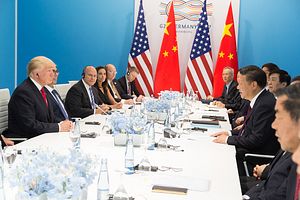After the White House claimed that the relationship between U.S. President Donald Trump and Chinese President Xi Jinping “is an extremely close one,” Trump decided to give his counterpart a slap in the face.
On August 14, Trump signed a memorandum ordering the US Trade Representative (USTR) to probe into China’s intellectual property practices. Such an investigation could eventually lead to the US imposing trade sanctions on China. Immediately after the order, China expressed “grave concern” toward the decision and vowed to “absolutely defend its interests” if any harm occurs. As the Brookings Institution forecasted, “Trump could be on the brink of starting a trade war with China.”
Trump called the memo “a very big move,” as it demands that the USTR explore whether to undertake a deeper Section 301 investigation. Section 301 of the Trade Act of 1974 authorizes the U.S. president to take any trade action, including retaliation, against foreign countries. Section 301 was widely used in the 1980s and rarely used since World Trade Organization (WTO) started to function in the 1990s.
Immediately after the order, USTR Robert Lighthizer issued a statement in response:
China industrial policies and other practices reportedly have forced the transfer of vital U.S. technology to Chinese companies. We will engage in a thorough investigation and, if needed, take action to preserve the future of U.S. industry. Thousands of jobs are at stake for our workers and for future generations. This will be one of USTR’s highest priorities, and we will report back to the President as soon as possible.
The American officials’ strong remarks triggered China’s pushback.
China’s Ministry of Commerce (MOC) on August 15 expressed “grave concerns” and warned the U.S. not to become a “saboteur of a multilateral rule,” namely WTO mechanisms, in a statement.
MOC urged the the United States to treasure “the current sound Sino-U.S. economic and trade ties and cooperation momentum. “
Finally, MOC vowed to take necessary actions if any harm is done:
If the U.S. side fails to respect basic facts and multilateral trade rules, and takes measures that harm bilateral economic and trade relations, China will definitely not sit by, but take all appropriate measures to resolutely safeguard its legitimate rights and interests.
In fact, the Brookings Institution has warned the Trump’s administration beforehand. In an analysis published on August 9, the Brooking Institution said: “If the U.S. does take protectionist measures, such as an across-the-board import tariff on Chinese products, we can be sure that China will retaliate.”

































